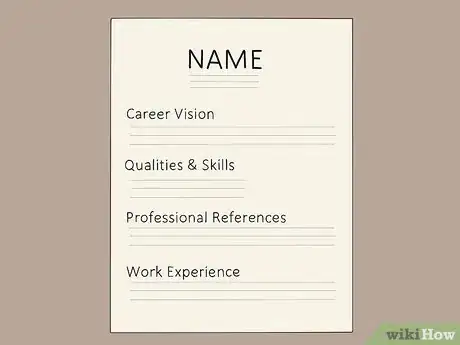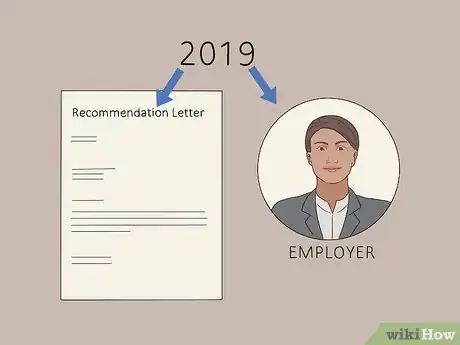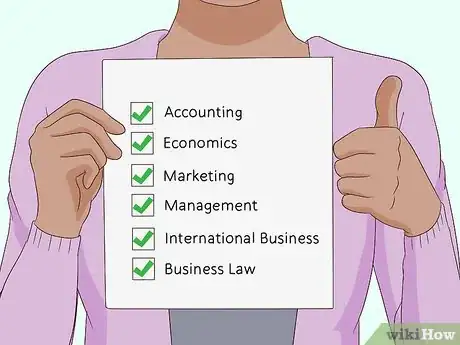This article was co-authored by Elizabeth Douglas and by wikiHow staff writer, Amy Bobinger. Elizabeth Douglas is the CEO of wikiHow. Elizabeth has over 15 years of experience working and managing teams in the tech industry. She has held roles in multiple areas, including computer engineering, user experience, and product management. She received her BS in Computer Science and her Master of Business Administration (MBA) from Stanford University.
There are 14 references cited in this article, which can be found at the bottom of the page.
This article has been viewed 69,548 times.
If you’re planning a career in business, getting your Masters in Business Administration (MBA) can help further your goal. This versatile graduate degree can help open doors for you, whether you’re planning to go into business for yourself or work for someone else.
Steps
Qualifying for Business School
-
1Get a bachelor’s degree in a subject that interests you. Since the MBA is such a broad graduate degree, you can choose practically any major. Think about what you want to do after you get your MBA and choose your major based on that.[1]
- If you are interested in starting your own robotics company, you might choose a mechanical engineering degree.
- If your goal is to be Chief Financial Officer (CFO) of a major corporation, you might major in accounting.
-
2Participate in extracurriculars in college. Your extracurricular activities don’t have to be related to business. When you apply to business school, the admissions board will want to see that you were active in areas outside of just school.[2]
- It’s better to focus on one or two activities that you’re really passionate about rather than several all at once. You might think it will look better on your business school application, but it could end up looking like you stretched yourself thin.
Advertisement -
3Take the GMAT or GRE. The GMAT is the most popular standardized test for getting into business school, but many business schools will accept either the GMAT or the GRE. The GMAT emphasizes quantitative data, such as math skills, while the GRE has a stronger emphasis on vocabulary.[3]
- Take a diagnostic exam for each test to see which one you’ll do best on. You can take either test multiple times if you don't get the score you want on the first try.
- Plan to spend 3-6 months preparing for this exam. Your score will be a major factor in whether or not you’re accepted to your top choice for business school, so don’t wait until the last minute to start preparing. Take a prep course, hire a tutor, or study with friends who are also hoping to go to business school.[4]
-
4Get real-world work experience. Most MBA programs don’t hire candidates who are straight out of an undergraduate program. If you want to go straight from college into business school, having a job during college that will show the admissions board that you already have some business knowledge. Otherwise, plan to work for at least a year or two before going into an MBA program.[5]
- Any job which requires business skills will be helpful, but office jobs are especially preferred.
Choosing a Business School
-
1Research schools to find the right match for your goals and experience. You should spend a lot of time thinking of what you hope to get out of business school during the research process. Be honest with yourself about your strengths and weaknesses, and find schools which are a good match for your unique academic and professional goals.[6]
- Choose schools which are accredited by the Association to Advance Collegiate Schools or Business (AACSB) to appeal to more employers after school.[7]
-
2Examine the cost of an MBA to make sure it's right for you. Business school is expensive, so you should be sure this is the path for you before you enroll. You should have a clear idea of the career you hope to have after graduation, as well as your salary expectations and how long it will take you to pay off any loans.[8]
-
3In 2017, tuition at the top 20 business schools in the country was $40,000 or higher, and this doesn't include the cost of room and board or books. The cost is lower at smaller schools, but you're still likely to pay upwards of $10,000 per year for a decent education.[9]
-
4Ask your employer to sponsor your MBA if you plan to stay with the company long-term. Some companies will sponsor promising employees who want to get an MBA, seeing it as an investment in the company's future. You may have to sign an agreement to stay with the company for a set amount of time after you graduate.[10]
-
5Look for a program which fits your schedule. Do you want to go to school full-time to finish faster, or do you need to attend class part-time so you can still work? Some schools offer executive MBAs for business professionals, and other schools have online MBA programs.[11]
-
6Apply to at least 4 business schools. To increase your chances of being selected for an interview, apply to at least 4 schools, but no more than 6. Choose at least 1 school whose minimum requirements are a little bit of a stretch for you (known as a “reach” school). Also choose at least 1 safety school, or school that you are sure you could get into but which isn’t your first choice.[12]
Applying to MBA Programs
-
1Build a business school resume. Your application to business school should be similar to a resume for job seekers, but it will also include an essay stating what you hope to accomplish by obtaining an MBA. List your best qualities and skills, as well as professional references and relevant work experience.[13]
-
2Choose current and recent employers to write recommendation letters. Someone you worked for over a summer in high school is not as strong of a reference as your most recent employer. Try to build relationships with your employers from the beginning of your employment. This way, their letter will seem more natural and personal.[14]
- If you don't have recent work experience, ask your college professors to write you letters of reference.
-
3Write your MBA essay. Your MBA essay should show the admissions board your personality as well as your reason for wanting to attend their business school. You should write a unique essay for each school, demonstrating why your skills and experience make you a good fit for their program. The length of the essay may vary depending on the school, so check their requirements.[15]
- Use a cordial tone throughout the essay but don’t be too familiar. You want to seem friendly but still professional and confident but not cocky.[16]
- Be your authentic self. Admissions board members go through a lot of applications, so you’ll need to emphasize what makes you unique in order to really stand out. Use objective evidence of your past successes and experience to show why you would be a value to their program.[17]
- Avoid using too much technical language in your essay. The person reading your essay might not know much about the industries you’ve worked in, so use plain language to ensure they’ll know exactly what you’re talking about.[18]
-
4Prepare for an interview. If your application is successful, you’ll be asked to interview before you’re accepted. Be prepared to answer questions about your education and work history as well as personal questions about your hobbies and history. Practice answering the interview questions out loud, either with a friend or by yourself in the mirror.[19]
-
5Common interview questions might include "Why are you interested in this program?", "What are your strengths and weaknesses?", and "Tell us about a time you took a leadership role."[20]
- When you’re in the interview, be sure you fully answer all of the questions. Don’t get off track or attempt to avoid answering a question.[21]
Succeeding in Business School
-
1Complete your coursework. Once you’re accepted into the MBA program, you’ll likely be required to take courses in accounting, economics, marketing, management, international business, and business law. Focus on passing each class, even the ones you don't love. Set aside time each day to study in a quiet place that's free of distractions.[22]
-
2Take classes out of your comfort zone. The point of going to business school is to push yourself beyond what you already know, so take a few classes that are innovative or especially challenging to you. You might not think you'd benefit from a class centering on the microfinance of the Deutsche Bank, but you would be surprised at how applicable some of the information may be.[23]
Take the risk. "There was a lot of "cold calling" in business school, and I was so nervous to speak up in class. Looking back, I realize that a huge part of the learning experience in business school is building up your confidence for sharing your own thoughts, and the best way to do that is to take that risk in class. It was so intimidating at the time, but I know it was really good practice for the real world." -Liza, successful recipient of her MBA
-
3Keep an open mind about your future. As you progress through business school, you'll be exposed to new ideas and approaches to business. Most schools bring in companies during the recruitment process to show students what it's like to work in different fields. You might go into business school planning to become a banker and leave with a passion for helping fund startups, so keep an open mind throughout the MBA process.[24]
-
4Go on informational interviews. As you start to narrow down your career focus, contact business professionals in fields you're interested in and ask them for informational interviews. These are informal interviews where you ask questions about what the professional's work day is like and their perspective on their industry. This is an excellent way to find out what it's really like to work in a specific field.[25]
-
5Be social to make the most of networking. Business school is a great place to make connections that can help you throughout your career. Make the most of social events, study groups, and team projects — you never know which of your classmates (or professors) might end up being a successful entrepreneur!
-
6Keep up with your extracurriculars. Make time for the things you love outside of school. Business school is busy and difficult, and having an activity you enjoy can help relieve your stress. Maintaining an extracurricular activity through business school will also show potential employers that you are versatile and capable of handling pressure.[26]
Expert Q&A
Did you know you can get expert answers for this article?
Unlock expert answers by supporting wikiHow
-
QuestionIs getting an MBA worth it?
 Elizabeth DouglasElizabeth Douglas is the CEO of wikiHow. Elizabeth has over 15 years of experience working and managing teams in the tech industry. She has held roles in multiple areas, including computer engineering, user experience, and product management. She received her BS in Computer Science and her Master of Business Administration (MBA) from Stanford University.
Elizabeth DouglasElizabeth Douglas is the CEO of wikiHow. Elizabeth has over 15 years of experience working and managing teams in the tech industry. She has held roles in multiple areas, including computer engineering, user experience, and product management. She received her BS in Computer Science and her Master of Business Administration (MBA) from Stanford University.
CEO of wikiHow I think it really depends on what you're looking for. If you want to learn a lot about business, meet amazing people, and learn from them, which is what I wanted, and it's financially feasible for you to do so, then it's definitely worth it. If you're just going because you think it's important to add MBA to your resume, then it might not be.
I think it really depends on what you're looking for. If you want to learn a lot about business, meet amazing people, and learn from them, which is what I wanted, and it's financially feasible for you to do so, then it's definitely worth it. If you're just going because you think it's important to add MBA to your resume, then it might not be.
References
- ↑ https://www.moneycrashers.com/what-is-mba-why-get-mba-degree-business/
- ↑ https://www.forbes.com/sites/mattsymonds/2016/03/31/30-tips-for-your-mba-admissions-success/2/#7d9f7fd76f90
- ↑ https://www.usnews.com/education/best-graduate-schools/top-business-schools/articles/2017-03-24/how-do-i-apply-for-an-mba-10-steps-to-success
- ↑ http://www.economist.com/whichmba/application-dos-and-donts
- ↑ https://www.moneycrashers.com/what-is-mba-why-get-mba-degree-business/
- ↑ https://www.usnews.com/education/best-graduate-schools/top-business-schools/articles/2017-03-24/how-do-i-apply-for-an-mba-10-steps-to-success
- ↑ https://www.moneycrashers.com/what-is-mba-why-get-mba-degree-business/
- ↑ https://www.usnews.com/education/best-graduate-schools/top-business-schools/paying-for-mba
- ↑ https://www.usnews.com/best-graduate-schools/top-business-schools/mba-rankings
- ↑ http://www.businessinsider.com/how-to-get-your-employer-to-pay-for-your-mba-roderick-lewis-2012-11
- ↑ https://www.moneycrashers.com/what-is-mba-why-get-mba-degree-business/
- ↑ https://www.usnews.com/education/best-graduate-schools/top-business-schools/articles/2017-03-24/how-do-i-apply-for-an-mba-10-steps-to-success
- ↑ http://www.economist.com/whichmba/application-dos-and-donts
- ↑ http://www.economist.com/whichmba/application-dos-and-donts
- ↑ https://www.princetonreview.com/business-school-advice/mba-essay-tips
- ↑ https://www.usnews.com/education/best-graduate-schools/top-business-schools/articles/2017-03-24/how-do-i-apply-for-an-mba-10-steps-to-success
- ↑ https://www.forbes.com/sites/mattsymonds/2016/03/31/30-tips-for-your-mba-admissions-success/#58f90f9d3269
- ↑ https://www.forbes.com/sites/mattsymonds/2016/03/31/30-tips-for-your-mba-admissions-success/#58f90f9d3269
- ↑ https://www.princetonreview.com/business-school-advice/business-school-interview
- ↑ https://www.mba.com/us/plan-for-business-school/apply-to-school/interviews/seven-commonly-asked-business-school-interview-questions.aspx
- ↑ http://www.economist.com/whichmba/application-dos-and-donts
- ↑ https://www.moneycrashers.com/what-is-mba-why-get-mba-degree-business/
- ↑ https://www.forbes.com/2010/08/09/most-innovative-business-school-classes-entrepreneurs-management-sustainable-tech-10-innovative.html#58e1a5835652
- ↑ https://www.forbes.com/sites/kimberlywhitler/2015/10/26/13-tips-from-mba-students-on-how-to-succeed-in-a-top-tier-program/#2b12c9ad5005
- ↑ https://money.usnews.com/money/careers/articles/2012/07/26/what-is-an-informational-interview-anyway
- ↑ https://www.forbes.com/sites/kimberlywhitler/2015/10/26/13-tips-from-mba-students-on-how-to-succeed-in-a-top-tier-program/#2b12c9ad5005
About This Article
Getting an MBA can open doors for you as a businessperson, whether you want to start your own business or work for someone else. To get started, look for business schools that are a good fit for your professional goals. Then, apply to multiple schools, emphasizing your best qualities and real-world work experience on your application. You'll also want to include professional recommendations from current and recent employers and write an essay that shows why you're a good fit for the school. For more tips from our CEO co-author, like how to succeed in business school, scroll down!
































































